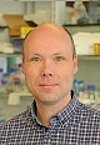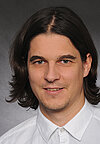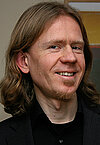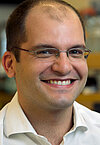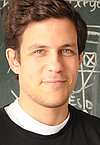ERC Starting Grants

Prof Dr Dorothea Golze (2025)
Dr Dorothea Golze, Chair of Theoretical Chemistry (Quantum Chemistry). Accurately modelling photoexcitation and the excited-state dynamics of materials' interfaces. Irradiation with light can cause a number of changes in materials. For example, light absorption can trigger photochemical reactions on surfaces. Advanced computer simulations provide detailed insights into processes that can guide the development of new photonic devices with versatile functions. The aim of the ERC-funded PhotoMat project is to develop high-precision methods for predicting nuclear forces in the excited state as well as properties and dynamics at the interfaces of materials, enabling calculations of system sizes up to 1,000 atoms. The methods will be based on the ab initio theory of the Green's function. More
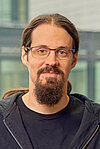
Dr Jens Hör (2025)
Dr Jens Hör, JMU Junior Professor, Helmholtz Institute for RNA-based Infection Research (HIRI) Elucidating molecular principles of RNA phage-host interaction (RIBO-PHAGE). In the realm of viruses, there are also specimens that do not infect humans or animals, but bacteria. These viruses are called phages and are characterised by enormous biological diversity. They serve science well as research tools and sources for biotechnological methods. They have also been used to make progress in the fight against multi-resistant bacteria. Until now, however, research has neglected the potential of those phages whose genetic material consists of RNA. They differ fundamentally from phages with DNA genomes: they pursue unique strategies to multiply in bacteria, and their victims in turn defend themselves against the infection with specific strategies. It is precisely these processes that Jens Hör wants to analyse in his ERC project RIBO-PHAGE. Among other things, he sees this as the basic prerequisite for being able to use RNA phages in therapies.
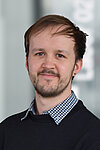
Dr Jake Greenfield (2025)
Dr Jake Greenfield, Head of a Junior Research Group, Organic Chemistry, Helical Out-of-Equilibrium Systems: Exploring Light-Induced Structural Distortions (HeliOS). In nature, there are impressive examples of how spiral structures store and release energy: Some seed pods use this strategy to literally explode, scattering their contents far and wide. Inspired by these principles, Jake Greenfield is investigating how spiral-shaped molecules can be deformed in his ERC project HeliOS. To achieve this, he couples the spirals with light switches - molecules that reversibly change their structure under the influence of light. In addition to the widely used azo-based switches, next-generation imine-based switches developed by Greenfield's team and at JMU's Center for Nanosystems Chemistry are also used. The aim of the project is to develop light-sensitive spiral molecules and precisely control their properties with light pulses. Among other things, this could enable new strategies for energy storage.

Dr Mona Garvert (2025)
Dr Mona Garvert, Assistant Professor of Neuroscience: Neurocomputational mechanisms underlying adaptive flexibility in cognition, emotion and behaviour (CogFlex). People often believe that their behaviour is purely rationally controlled by cognition. However, emotions have a profound influence on how we perceive the world, process information and ultimately act. Despite this, science often looks at these two brain functions in isolation from each other. Mona Garvert's goal is to overcome this separation: In her ERC project CogFlex, she wants to prove that emotions have a direct influence on the way the human brain maps the environment and how it generalises, updates and reacts to information. To do this, the researcher uses high-resolution functional magnetic resonance imaging and mathematical modelling, among other things. Her work should provide new insights into the neurobiological basis of flexible behaviour. In the long term, it could also expand our knowledge of mental illnesses in which these processes are disrupted.
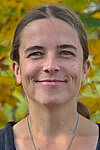
Dr Jacqueline Degen (2025)
Dr Jacqueline Degen, research group leader at the Biozentrum : From streetlight to starlight: How light pollution disrupts insect orientation and alters habitat connectivity (LIGHTSTAR). Moths are ecologically important insects because they pollinate many plants and other animals feed on them. However, like other nocturnal creatures, they are threatened by light pollution: illuminated settlements and roads light up the night and disrupt the butterflies' ability to orientate themselves. Jacqueline Degen is investigating these relationships in her ERC project LIGHTSTAR. Science does not yet understand well enough how moths orientate themselves and react to light. The researcher will develop a drone-based 3D tracking system to record the behaviour of insects in large-scale field experiments with a spatial and temporal resolution that has never been achieved before. The data obtained, together with innovative simulation tools, will significantly expand our knowledge of the effects of light pollution. Among other things, the new findings can help to develop insect-friendly lighting solutions.
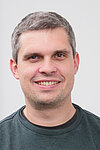
Dr Jerome Beetz (2025)
Dr Jerome Beetz, head of an Emmy Noether junior research group at the Biozentrum Neural representation of space: From individual to social place learning in bees (BeeSpace). Humans navigate their environment with ease every day. We owe this to the cognitive maps of our surroundings that our brains have created. How insects memorise their surroundings is the subject of Jerome Beetz's planned research. He recently developed techniques for recording the brain activity of freely navigating insects and identified navigation-relevant nerve cells that are very similar to those of vertebrates. On this basis, he wants to investigate the neuronal basis of insect navigation in more detail in his ERC project BeeSpace. "If we understand how insects navigate through their native terrain using relatively simple neuronal circuits, we can also identify innovative ways to develop autonomously navigating vehicles," says the researcher.
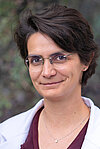
Dr Beatrice Baragli (2025)
Dr Beatrice Baragli from the Chair of Ancient Near Eastern Cultures, Late Sumerian: The Afterlife of an Ancient Near Eastern Language (LASU). Sumerian is probably the oldest documented language of mankind, and its writings are among the most important sources for the study of the Ancient Near East. However, two fundamental questions remain unanswered: Why did the cultural and religious elite of the Ancient Near East use Sumerian until around the time of Christ's birth, when the last native Sumerian speaker had died 2,000 years earlier? And what enabled Sumerian to survive many other languages of the time? In her ERC project LASU, Beatrice Baragli wants to prove that Sumerian lasted so long because it was considered sacred. She is pursuing an innovative philological and religious-historical approach. It aims to apply a framework based on language orders in order to decipher the interactions of Sumerian with other languages of the Ancient Near East in the first millennium BC.
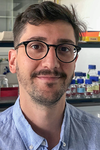
Dr. Dimitrios Papadopoulos (2024)
The MYCN protein: It is about a hundred thousand times smaller than a human hair and is the focus of research by Dimitrios Papadopoulos, junior group leader at the Department of Biochemistry and Molecular Biology at Julius-Maximilians-Universität Würzburg (JMU). MYCN is a so-called transcription factor, i.e. a protein that attaches itself to the human genome (DNA) and thus controls the growth of cells. If above-average quantities of MYCN are present in a cell, this can lead to cancer. At the University of Würzburg, Dimitrios Papadopoulos is researching RNA-based mechanisms of aggressive childhood tumors. He has now been awarded one of Europe's most coveted grants for young scientists. Mehr
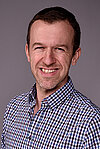
Dr. Jakob Zimmermann (2024)
With a total volume of 1.6 million euros, the European Research Council (ERC) is funding a multi-year scientific project investigating the interaction between intestinal flora and the immune system. Research group leader Jakob Zimmermann, who successfully acquired the funding, wants to better understand the T-cell immune memory in the intestine. This understanding is crucial for new therapeutic approaches against chronic inflammatory bowel diseases and for the improved design of vaccines. More
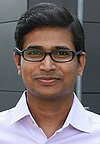
Dr. Princekumar Ravat (2022)
Princekumar Ravat has been a research group leader at the Institute of Organic Chemistry since 2018. He plans to use the Starting Grant to launch a project to develop a new class of chiral semiconductors. Chirality describes a property of molecules that is related to their symmetry. Chiral organic semiconductors are needed as new materials to drive the development of next-generation (opto)electronics, such as spin LEDs, 3D displays and quantum-based optical computing. More

Prof. Dr. Alexander Westermann (2022)
Alexander Westermann investigates the intestinal microbiota. He has now been awarded a Starting Grant of 1.5 million euros from the European Research Council (ERC). More

Prof. Dr. Mathias Munschauer (2022)*
Researcher Mathias Munschauer aims to better understand SARS-CoV-2. He now receives funding of 1.5 million euros for his research project “COVIDecode” from the European Research Council (ERC). Munschauer is the third scientist at the Helmholtz Institute for RNA-based Infection Research (HIRI) in Würzburg to be awarded an ERC grant. More
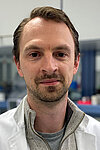
Dr. Kai Kretzschmar (2021)
Cancer researcher Dr Kai Kretzschmar wants to find out why oral cancers are so heterogeneous. He is receiving funding of 1.5 million euros for this project.
More

Jun.-Prof. Dr. Neva Caliskan (2020)
The European Research Council (ERC) is awarding the renowned funding, of up to 1.5 million euros over a period of five years, to Neva Caliskan. More
Prof. Dr. Crispin Lichtenberg (2020)*
Chemist Crispin Lichtenberg has received one of the European Research Council's Starting Grants worth around 1.5 million euros. He wants to use it to explore the potential of novel chemical compounds. More...
Prof. Dr. Joanna Wencel-Delord (2020)**
From hydrocarbons to original chiral building blocks: new solutions for sustainable & asymmetric CH functionalization of alkanes. More
Prof. Dr. Nicolai Siegel (2016)*
How do pathogens such as bacteria or parasites manage to hide from their host's immune system? Biochemist Nicolai Siegel is looking into this question within the scope of a new research project funded by the European Union with EUR 1.5 million. More ...
Prof. Dr. Viktoria Däschlein-Geßner (2016)*
The scientist Viktoria Däschlein-Geßner works in inorganic chemistry where she investigates the synthesis of fine chemicals. She was awarded an ERC Starting Grant worth 1.5 million euros. More ...
Prof. Dr. Christian Schneider (2016)*
Physicist Christian Schneider studies promising materials for novel lasers and quantum light sources. The European Research Council has awarded him 1.5 million euros to pursue his work. More...
Dr. Grzegorz Sumara (2016)*
A European Research Council grant worth around 1.5 million Euros has been awarded to Dr. Grzegorz Sumara, a biologist from Würzburg (Germany). It supports his outstanding research proposal about the widespread disease obesity. More...
Prof. Dr. Katrin Paeschke (2014)*
Dr. Katrin Paeschke's research focuses on unusual folds in the genome, the so-called G-quadruplex structures. With the funds from her 1.5 million euro ERC Starting Grant, Dr. Paeschke will be able to conduct more extensive research in this field. More...
Dr. Daniel Lopez (2013)*
Daniel Lopez leads a junior research group at the university's Research Center for Infectious Diseases. For his research on pathogenic bacteria, he was awarded an ERC Starting Grant worth around 1.5 million euros. More…
Prof. Dr. Ronny Thomale (2013)
As the Chair of Theoretical Physics, Professor Ronny Thomale is conducting basic research on superconductors and quantum computers. For his work, he was awarded a 1.3 million euro ERC Starting Grant. More…





